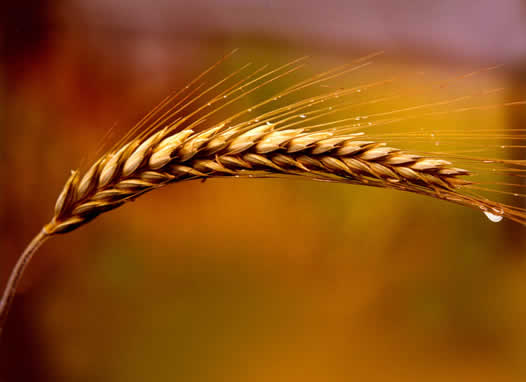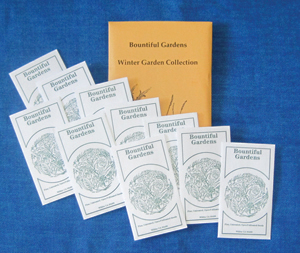Heirlooms, GMOs, Hybrids, Open-Pollinated:
What Do All Those Words Really Mean?
Image: A stalk of Grain All the different seed types available today can be confusing. The following, from the Bountiful Gardens catalog, is a well-researched clarification. If you would like learn more about BG or receive the catalog, please visit them at www.bountifulgardens.org. TRADITIONAL PLANT BREEDING starts by pollinating the flower of a plant with pollen from a related, but slightly different, variety. Then, over several generations, the plants are selected for certain traits. In this way, broccoli, for example, became different from the tough wild plants that are its ancestors. OPEN-POLLINATED: As people keep selecting their best plants for seed, the results gradually become more predictable. Eventually every time you plant that kind of seed, the plants give similar results. Then the seed has been stabilized as an open-pollinated variety. The animal equivalent would be beagles or golden retrievers—you know what to expect in looks and, to some extent, behavior, because they are purebred. Individuals have slight variations within the “family resemblance.” HEIRLOOM SEEDS are open-pollinated varieties that have been around a long time (50 years minimum). Older varieties are often more nutritious and more adapted to organic cultivation—that used to be all there was. Farmers and gardeners are breeding new open-pollinated varieties today that will be the heirlooms of the future. Some people use “heirloom” to mean any open-pollinated variety, new or old, so if you are looking for old varieties, ask the seller what they mean. HYBRID SEEDS are seeds from the first generation of a cross between two varieties. Plants from hybrid seeds are very uniform and predictable, which is why farmers use them (they might all be ready to harvest the same day, for example). However, the next generation of plants won’t be predictable because it is not a stabilized variety—sometimes they are even sterile. The seed doesn’t “breed true” for seed saving, so you have no choice but to buy new seed over and over. Hybrids make gardeners dependent on the companies who produce the seed. Modern commercial hybrids are usually produced using parent varieties that are secret and are not for sale. (The exact cross is controlled either by hand-pollinating the flowers or by planting one row of plants that are only wanted as pollen donors and the next row with seed-bearers incapable of producing viable pollen.) In practice, this gives the company producing the hybrid a monopoly, because the parentage of the seed is a trade secret. By law, hybrid seeds must be labeled “hybrid” or “F1” next to the variety name. We don’t carry hybrids. We feel that food crops should be a common heritage we all share, not a set of trade secrets. Food independence must include seed saving for local conditions. GMO VARIETIES are not the result of traditional plant breeding, but of procedures in a laboratory. Instead of using pollen from another plant, technicians can insert genes that don’t even come from plants—some have come from a bacteria or a fish. Often, viruses are used to insert the desired gene. The main GMO crops are corn, soy, canola, sugar beets, alfalfa, papaya, cotton, and zucchini squash. GMO seeds are mostly sold to big agribusiness farms that sign a contract with the GMO company. The primary danger to home gardens is not from the seeds we buy (GMO seeds are not sold in the home garden packet trade--they are too expensive.) The real concern is pollen in the air and the food at the store, which tends to have GMO ingredients if it is processed and not certified Organic. We do not carry GMOs. We don’t buy any seed at all from the companies who produce GMOs. RECENTLY, WE HAVE BECOME AWARE OF ANOTHER FORM OF GENETIC MANIPULATION. It is called Cell Fusion CMS technology. CMS stands for cytoplasmic male sterility. An example of this technology is the 1996 patent for making chicory hybrids with cellular mitochondria from sunflowers. In this example, a cell from endive and one from sunflower are selectively irradiated to destroy the nucleus of one and the cytoplasm of the other. Their cell walls are dissolved, and the cells are merged into a single cell that is then grown in a laboratory into a plant that cannot produce pollen. It can then only receive pollen from the selected parent variety. This technology meets the definition of genetic engineering under International Organic standards. However, it is not considered GMO in the United States. To date, this procedure is unregulated and does not disqualify a seed from organic certification. The only way to avoid Cell Fusion CMS at present is to stay away from hybrids entirely or to research each variety. We do not carry any hybrid seed, and so there are no Cell Fusion CMS seeds in this catalog. We urge you to write your congressman if this technology is of concern to you. TREATED SEEDS are coated with pesticide or fungicide chemicals after harvest. We don’t carry any treated seed. CERTIFIED ORGANIC SEED has to come from farms inspected by the USDA’s Organic Certification program. They can’t use chemicals and must meet other requirements OPEN SOURCE SEED is a new movement to protect seeds from privatization and patenting. We strongly support these public-spirited growers and breeders. For more information, visit http://www.opensourceseedinitiative.org
top | Newsletter Home | Article Index | Archive
|




